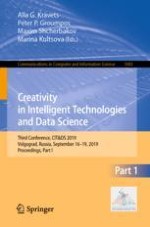
2019 | OriginalPaper | Chapter
Designing AI Futures: A Symbiotic Vision
Author : Karamjit S. Gill
Published in: Creativity in Intelligent Technologies and Data Science
Publisher: Springer International Publishing
Activate our intelligent search to find suitable subject content or patents.
Select sections of text to find matching patents with Artificial Intelligence. powered by
Select sections of text to find additional relevant content using AI-assisted search. powered by